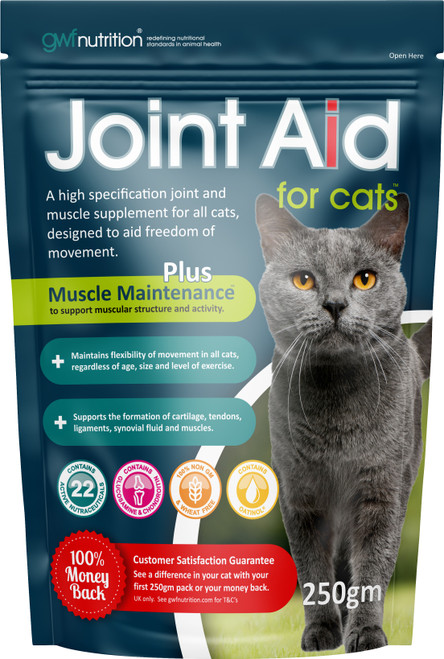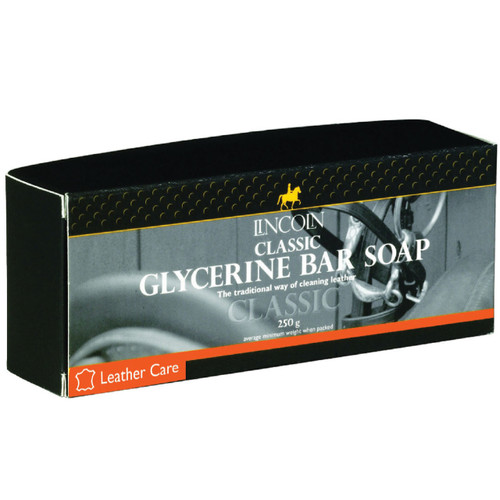- Maintains flexibility of movement in all cats regardless of age, size and level of exercise.
- Supports the formation of cartilage, tendons, ligaments, synovial fluid and muscles.
- Helps maintain the natural anti-inflammatory actions of the cat's metabolism.
- Provides a unique combination of 22 active nutraceuticals.
- Contains the Oatinol® Delivery System™ to maintain a high rate of nutrient absorption.
- Contains high levels of Omega 3 to support optimum health and performance.
- 100% wheat free.
- A 100% Non GM, soya free formulation.
- Manufactured to Universal Feed Assurance Scheme (UFAS) standards as palatable, easy-to-feed 2mm pellets.
Joint Aid for Cats is a high specification joint and muscle supplement with glucosamine; designed to aid freedom of movement in all cats. It also contains 'Muscle Maintenance' to support muscular structure and activity. Simply add to feed - 2 Measures (20gms)/Day.
What are the Benefits of Feeding Joint Aid for Cats?
We understand the need for supplying specialist nutracines to help maintain the structure and physiology of the joints and associated bone, cartilage and tendon. Joint degradation can occur due to one of two main reasons; wear and tear can occur simply as a function of age, or it can be caused by mechanical damage due to enhanced activity.
What we are also beginning to understand is what also happens to muscle and merely increasing protein intake is not the most efficient route to supporting muscular activity.
All cells contain protein in some form and the makeup depends on the type of cell. Even muscle cells vary between the types – smooth, cardiac and voluntary – as does the impact of normal processes affect their maintenance. For example, the abrasive effect of food passing along the gut, wearing down the absorptive surfaces, means massive regeneration and the gut wall has the largest need for dietary protein.
The voluntary, or striated, muscles also suffer from high levels of wear. We are probably all aware of the “ratchet” mechanism of muscle contraction, where muscle fibres slide over each over, but it does have certain limitations. Foremost is the conversion of a biochemical process (energy generation in the form of ATP) into a mechanical result, and it is accompanied by the generation of ultrastructural damage and the release of oxidative free radicals.
In line with all metabolic processes there is a balance between anabolism (building) and catabolism (breakdown). Normal levels of activity are within the natural constraints and muscle wear is matched by regeneration.
However, there is a biochemical and physiological process to muscle damage. Muscular activity induces protein breakdown and the release of inflammatory markers and immunomodulatory cues which mop up damaged particles. At the same time, oxidative free radicals and enzymes continue the process of protein breakdown.
Countering this is the process of protein deposition and tissue repair. It is initiated by an increase of vascular activity (blood supply) to the site of damage; not only will this improve the oxygen supply, which is beneficial for energy metabolism especially in slow twitch muscle fibres, but increase the relevant nutrients and metabolites needed for muscle regeneration.
There are two aspects to muscle repair, whilst protein deposition would seem the most obvious, lipid metabolism is essential. Muscle fibres are, in the main, protein strands, but are encased in a protein/lipid complex cell membrane and it is the chemical properties of the both the neutral lipids and the phospholipids that allow the strands to slide over each other; giving rise to contraction.
Both vascular development and cell membrane lipids benefit from Omega-6 and Omega-3 fatty acids.
Nutraceuticals are products derived from food sources with extra health benefits in addition to their basic nutritional value.
Amino Acids (x5)
High levels of 5 particular dietary amino acids, essential for the production of muscle tissue.
Chondroitin
Chondroitin is essential for the resilience of cartilage. It maintains normal enzymatic activity and water holding capacity to provide healthy resistance to compression.
Collagen Matrix
Collagen possesses great tensile strength and provides the framework that gives tissues their firmness and resilience. It is essential for connecting and supporting the bones, tendons, muscles and cartilage.
Curcumin
Curcumin is the active ingredient of the spice, turmeric. It is a natural and powerful antioxidant and supports the normal anti-inflammatory action of the body in conjunction with vitamins: C and E and selenium.
Glucosamine
Glucosamine gives cartilage its structure and shock absorbing qualities. It is involved in the formation of cartilage, tendons, skin, bone and ligaments.
Glutamic Acid
Glutamic Acid is a natural flavour enhancer and an important nutritional support for natural gut health during times of stress.
Hemp Oil Derived Omega 3 Fatty Acids
Crucial for maintaining the natural anti-inflammatory action of the body.
MSM (Methylsulfonylmethane)
MSM is a source of sulphur, which helps to form cross links with other molecules that maintain the strength and integrity of connective tissues. It is also essential for the manufacture of collagen.
Piperine Black Pepper Extract
Supports the retention in the metabolism of some active nutraceuticals e.g. curcumin.
Trace Minerals (x3)
Provides selenium, manganese and magnesium to help maintain low levels of muscle reaction to work.
Vitamin C
Vitamin C is essential for the production of collagen in the body that forms the matrix of connective tissues in mammals. It directly affects the level of tissue growth and development and the maintenance of the body's immune system.
Vitamin E
A natural antioxidant and essential for the health of reproductive, muscular, circulatory and nervous systems and immune functions in the metabolism.







